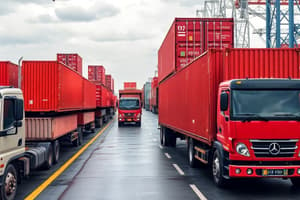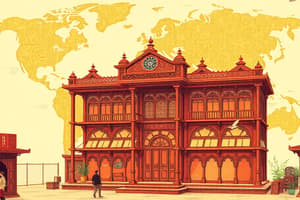Podcast
Questions and Answers
What is the purpose of tariffs in import/export regulations?
What is the purpose of tariffs in import/export regulations?
- Discourage domestic industries from growing
- Generate revenue for governments and protect domestic industries (correct)
- Encourage foreign industries to compete fairly
- Ensure free trade agreements between nations
Which aspect of import/export regulations imposes limits on the volume of specific imports allowed during a specified period?
Which aspect of import/export regulations imposes limits on the volume of specific imports allowed during a specified period?
- Intellectual property protection
- Quotas (correct)
- Licensing requirements
- Customs procedures
What role does the World Trade Organization (WTO) play in global trade?
What role does the World Trade Organization (WTO) play in global trade?
- Resolving disputes and setting rules (correct)
- Encouraging discriminatory practices
- Imposing trade barriers
- Subsidizing foreign industries
What do licensing requirements specify in the context of import/export regulations?
What do licensing requirements specify in the context of import/export regulations?
Why do governments establish legal frameworks and policies to regulate cross-border movements of goods and services?
Why do governments establish legal frameworks and policies to regulate cross-border movements of goods and services?
Which core principle is promoted by WTO members participating in global trade?
Which core principle is promoted by WTO members participating in global trade?
What do global supply chains refer to?
What do global supply chains refer to?
What is one of the advantages associated with global supply chains?
What is one of the advantages associated with global supply chains?
Which of the following is NOT a stage typically included in global supply chains?
Which of the following is NOT a stage typically included in global supply chains?
What is a key role of import and export regulations in international trade?
What is a key role of import and export regulations in international trade?
Why do companies establish global supply chains across multiple regions?
Why do companies establish global supply chains across multiple regions?
What makes global supply chains intricate and complex?
What makes global supply chains intricate and complex?
Flashcards are hidden until you start studying
Study Notes
International Trade: Understanding Global Supply Chains and Regulations
International trade is a dynamic web of economic activities through which countries exchange goods, services, capital, and ideas across borders. This interconnectedness has led to the establishment of complex global supply chains and intricate systems of export and import regulation. In this exploratory guide, we'll unpack these key components of international trade to better understand their role and significance in our globally connected economy.
Global Supply Chains
Global supply chains refer to the interdependent networks companies build around the world to source raw materials, produce products, distribute them, sell them, and return used resources back into the chain. These intricate webs encompass multiple stages from various regions, utilizing a diverse range of labor forces and resources with varying efficiency. Some prominent examples of global supply chains include automotive parts, electronics manufacturing, apparel production, pharmaceuticals, and agricultural commodities like coffee and tea.
Advantages associated with global supply chains stem from access to lower costs of production found in emerging markets, increased flexibility due to diverse sourcing options, and enhanced quality control brought forth by specialized producers. However, global supply chains also face challenges such as communication barriers, currency fluctuations, geopolitical risks, natural disasters, and regulatory uncertainty. Despite these obstacles, they remain a vital component of modern economic growth strategies worldwide.
Import / Export Regulations
Governments establish legal frameworks and policies to regulate cross-border movements of goods and services, aiming to protect national interests while fostering mutually beneficial trade agreements between nations. Key aspects of import and export regulations include tariffs, quotas, licensing requirements, customs procedures, intellectual property protection, safety standards, sanitary measures, and anti-dumping duties.
Tariffs are taxes imposed upon imported goods, designed to generate revenue for governments, encourage domestic industries, and deter unfair competition arising from foreign industries subsidized by state funds. Quotas impose limits on the volume of specific imports allowed during a specified period. Licensing requirements specify particular documents or permits needed before certain commodities may enter or exit one country. Customs procedures define how goods must be declared, valued, classified, and cleared for release throughout various checkpoints along transportation routes.
The World Trade Organization (WTO) plays a critical role in establishing consensus rules and dispute resolution mechanisms among its member states participating in global trade. WTO members have agreed to uphold core principles such as non-discrimination, transparency, and predictability, promoting free trade under a reciprocal, multilateral trading system.
In conclusion, understanding the dynamics of global supply chains and import/export regulations is essential when decoding the intricacies of today’s increasingly intertwined world economy. By exploring these elements more deeply, you will gain insight into a broad spectrum of factors impacting the global flow of goods, services, and information − ultimately providing a clearer picture of contemporary international affairs.
Studying That Suits You
Use AI to generate personalized quizzes and flashcards to suit your learning preferences.




